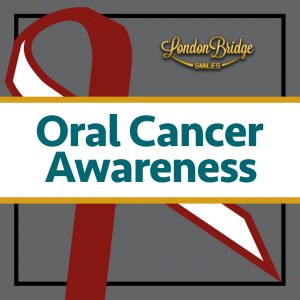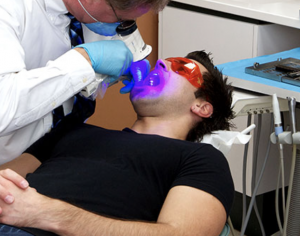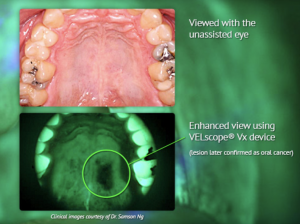 April is Oral Cancer Awareness month. Approximately 45,000 new cases are diagnosed per year in the US, and risk is increasing with the spread of HPV. Finding this disease in it’s earliest stages is the best chance for successful treatment.
April is Oral Cancer Awareness month. Approximately 45,000 new cases are diagnosed per year in the US, and risk is increasing with the spread of HPV. Finding this disease in it’s earliest stages is the best chance for successful treatment.
How common is oral cancer?
Oral cancer includes cancers of the lips, tongue, floor of the mouth, cheeks, throat (pharynx), sinuses, and hard and soft palate (roof of the mouth). The risk of developing oral cancer is increased by exposure to HPV (human papillomavirus), smoking tobacco products, and heavy consumption of alcohol. Risk increases with age and often occurs in people over the age of 40. Treatments can be very successful if oral cancers are detected early, and severely debilitating or life-threatening if left undetected and untreated. Finding this disease in it’s earliest stages is the best chance for successful treatment.
What are the signs and symptoms?
Paying close attention to changes in your oral health can help you identify any symptoms that may arise.
Here are some common things to look for:
- sore or irritated throat feeling that does not go away, hoarseness or changes in your voice
- sensation of a constant lump in your throat, visible lump in your throat or neck
- speckled (red/white) patches, unusual bumps, rough patches, swelling or eroded areas
- difficult or weakened ability to chew, swallow, or speak
- difficulty or pain moving the jaw or tongue
- an earache that is not attributed to sickness or inner ear problem
- numbness, pain, or loss of sensitivity in your mouth or lips
- open sore, wound, or bleeding that fails to heal after 2 weeks
Irregular symptoms accompanying oral cancer can include drastic weight loss and changes in the way your teeth fit together.
Can it be prevented?
Certainly your risk for mouth, throat, and other oral cancers can be lowered by changing or not developing particular habits. For example:
- HPV is becoming more common and many people are not aware that they have been infected. Practice safe sex to prevent the spread of HPV.
- Avoid tobacco products such as cigarettes, cigars, pipes, and chewing tobacco. Try your best to quit if you use these products regularly. Your risk for oral cancer goes down the longer you are tobacco free.
- Avoid heavy alcohol use.
- Use sunscreen and limit long periods of time in the sun to reduce the risk of lip cancer.
- Eat a diet high in fruits and vegetables.


How can my dentist help?
During your routine dental cleanings and exams at our office, our dentists and team will perform an oral cancer screening to check for the signs of oral cancer. London Bridge Smiles features advanced VELscope® technology to assist with oral cancer screenings. This device can detect oral cancer in the earliest stages. At our office, we are dedicated to doing all we can to detect and treat oral cancers and other abnormalities at the earliest possible stage. Make sure to talk to your dentist about any abnormalities you are experiencing that they may not be able to visibly see on their own.
Call us at 757-340-8805 today to learn more about VELscope oral cancer screening and to schedule your appointment with our dentists. It is quick, painless, and could save your life. Our team will perform a screening for oral cancer to check for symptoms, and we encourage you to contact us if you notice any of these problems or if you experience any other type of dental pain. We are committed to helping you stay in good health.
Photo credit: velscope.com


